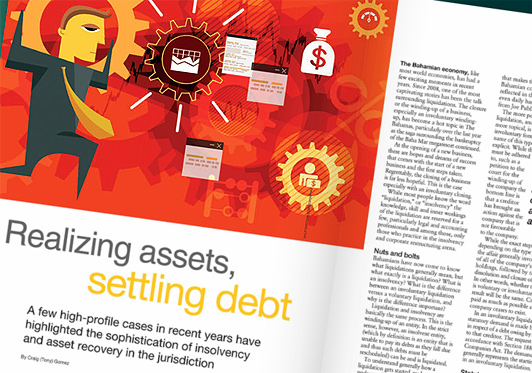| Published: Date: Updated: Author: |
The Bahamas Investor Magazine January 1, 2016 January 1, 2016 Craig "Tony" Gomez (pictured) |
The Bahamian economy, like most world economies, has had a few exciting moments in recent years. Since 2008, one of the most captivating stories has been the talk surrounding liquidations. The closure or the winding-up of a business, especially an involuntary winding- up, has become a hot topic in The Bahamas, particularly over the last year as the saga surrounding the bankruptcy of the Baha Mar megaresort continued.
Click here to read or browse this feature using Turn-Page/Ezine mode.
At the opening of a new business, there are hopes and dreams of success that comes with the start of a new business and the first steps taken. Regrettably, the closing of a business is far less hopeful. This is the case especially with an involuntary closing.
While most people know the word “liquidation,” or “insolvency” the knowledge, skill and inner workings of the liquidation are reserved for a few, particularly legal and accounting professionals and among those, only those who practice in the insolvency and corporate restructuring arena.
Nuts and bolts
Bahamians have now come to know what liquidations generally mean, but what exactly is a liquidation? What is an insolvency? What is the difference between an involuntary liquidation versus a voluntary liquidation, and why is the difference important?
Liquidation and insolvency are basically the same process. This is the winding-up of an entity. In the strict sense, however, an insolvent entity, (which by definition is an entity that is unable to pay its debts as they fall due and thus such debts must be rescheduled) can be and is liquidated.
To understand generally how a liquidation gets started, we have to understand who initiates the action. In a voluntary liquidation, the liquidation is normally initiated by the shareholders or directors of a company. Perhaps, the company no longer serves the purpose for which it was originally established. This is the simplest form and not normally the form of liquidation that makes the evening news. In the Bahamian context, these are normally reflected in the gazettes on a regular, even daily basis, with nary a blink from Joe Public.
The more popular form of liquidation, and the one that is far more topical, is the compulsory or involuntary form of liquidation. The name of this type of liquidation is very explicit. While there are processes that must be adhered to, such as a petition to the court for the winding-up of the company the bottom line is that a creditor has brought an action against the company that is not favourable to the company.
While the exact steps taken will vary depending on the type of liquidation, the affair generally involves the sale of all of the company’s property and holdings, followed by the complete dissolution and closure of the company. In other words, whether the liquidation is voluntary or involuntary, the end result will be the same. Creditors are paid as much as possible and the company ceases to exist.
In an involuntary liquidation, a statutory demand is made by a creditor in respect of a debt owing by a company to that creditor. The request is made in accordance with Section 188(a) of the Companies Act. The demand generally represents the starting point in an involuntary liquidation.
Statutory demands
However, creditors are not the only parties that can initiate the process. A shareholder or a regulator can initiate the process. For the purposes of this discussion the regulators are generally The Central Bank of The Bahamas, the Securities Commission of The Bahamas and the Insurance Commission of The Bahamas.
Statutory demands are used to prove the insolvency of a company rather than a means to collecting money owed. By law, the statutory demand must include a statement that the debt is to be paid within 21 days. Once that 21-day period expires, the petition for the winding-up of the company could commence. Failure to pay or settle a statutory demand serves as proof of a company’s insolvency.
The effect of liquidation proceedings commencing is that the liquidator would be appointed and the liquidator would have control and custody of the company’s assets. The principal duty of the liquidator is to take possession of, protect, realize and distribute the assets of the company (or the proceeds of the realization of those assets) to the company’s creditors in a reasonable and efficient manner.
Who can serve as a liquidator?
In a voluntary liquidation, per Section 215 of the Companies (Winding up Amendment) Act 2011, any person, including a director or officer of the company, may be appointed as its voluntary liquidator.
In an involuntary liquidation, under the Insolvency Practitioners Rules, 2012, a licensed professional accountant in good standing by an approved institute or a counsel and attorney of the Bahamas Bar with five or more years standing with the relevant, professional body, can serve as a court appointed liquidator (official liquidator). It is important to note that it is the individual who is appointed as liquidator and not a corporate entity or partnership.
Naturally, the prospective liquidator must be independent, both in fact and perception as, and is seen as above the conflict of interest sphere.
While we have rarely seen attorneys acting as liquidators, it would not be surprising to see members of the Bar, with significant regularity, seeking to obtain the relevant experience, first as liquidators in voluntary liquidation, then in involuntary liquidations.
However, in jurisdictions such as the US, a liquidator (also known as an insolvency practitioner or a trustee in bankruptcy) is an attorney. An example of this was the appointment of Irving H Picard as bankruptcy trustee in what is arguably the most famous bankruptcy/liquidation in the US in recent history, that of the Ponzi scheme run by Bernie Madoff’s company, Bernard L Madoff Investment Securities LLC.
So what does a liquidator do?
Once appointed, the liquidator’s mandate is to realize the assets of the company and to settle the creditors of the company. The creditors of the company certainly are for whom this process really exists and as previously stated, they often initiate the process. But not all creditors are equal. There is a ranking of creditors.
The secured creditors are secured and hopefully there are sufficient funds to settle their claims. If, and once the secured creditors are settled in full, then other preferential creditors must be settled. Among these are the government and employees. If an employee and employer is going into liquidation, the liquidation procedures will likely have serious implications.
If the liquidator decides against continued trading, employment will be terminated and plaintiff will claim any outstanding wages, salary, vacation pay and/or redundancy as a debt in the liquidation proceedings.
In the case of a director, he or she will remain in office after the commencement of the liquidation process, but with limited powers. Directors are expected to fully cooperate with the liquidator, including providing the liquidator with information regarding the business, accounts and affairs of the company in order to enable the affairs of the company to be fairly and equitably resolved.
With respect to the cost of contracting a liquidator, the liquidator’s fees and hourly remuneration are costs that are agreed to by the liquidation committee (creditors committee) and the liquidator. The payment of the liquidator’s fees is made via an application to the court. Of course in a voluntary liquidation the approval is likely to be made by the company being liquidated.
No place for the risk averse
Let there be no doubt, a liquidator’s job, apart from being a highly complex one, is one fraught with risk and not a job for the faint of heart. The potential for lawsuits; the possibility of performing and providing your services and still not being paid in full or being paid perhaps as much as several years after you have rendered a billing; interacting with many unscrupulous people or simply people who are very angry and upset, who may have lost their life earnings, makes this a very complicated undertaking.
The attention-grabbing newspaper headlines hardly match the risk that accompanies a liquidation assignment. The liquidation process is a costly one, but the focus is to ensure that creditors are settled to the greatest extent possible. Many times debts due to creditors cannot be settled in full simply because by the time the liquidator has been put in place there would normally have been some erosion in the company’s assets, hence the appointment of the liquidator.
As economies become more brittle, many entities will find that they will have challenges meeting their financial obligations. Consequently, especially in the case of The Bahamas, the liquidation option will be evaluated and that option will be exercised by many creditors of a domestic company.
A recent trend among creditors is that increasingly they will be looking to have their credit disputes settled by liquidation. As a result of the cost of a liquidation, it should be a final resort. Domestic creditors must be made aware that liquidations are a lengthy process. Other forms of resolution preferably negotiations, are far quicker. While voluntary liquidations can be completed quickly, an involuntary liquidation can take years.
Many times, most of the disputes can be settled by arbitration and mediation rather than liquidation. In fact, any contract that is constructed in today’s financial world should include a clause addressing conflict resolution, which conflict should first be addressed by mediation and arbitration.










